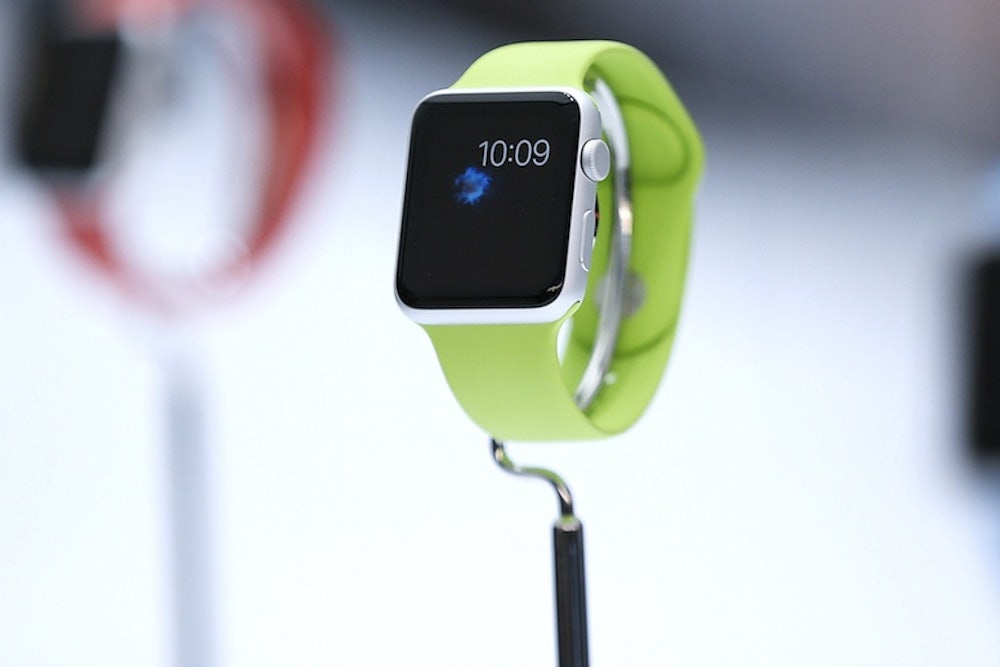Tech writers seem pretty happy about the Apple Watch, the rest of the world is having more of a mixed reaction. Me? I like it, and it’s not because I have a compatible iPhone. I think the device could help speed along a revolution in health—one that would make medical care more efficient and let us all stay a lot healthier.
The watch comes with the ability to collect some basic information, like pulse and steps taken, and then share it with an app called HealthKit. The app (a standard feature of the new iPhone operating system, as I understand it) also has the ability to collect information from other “wearables”—sensors that people can put on their bodies, to monitor other vital signs. It can store this information and transmit it—say, to a doctor’s office—if that’s what the person using the device wants. And that would be a big deal.
One of the biggest problems with health care today is the lack of ongoing, continuous care, particularly for people with chronic conditions. It means that doctors, nurses, and the rest of health care system spend a lot of time treating people with serious, sometimes urgent problems, rather than keeping them healthy in the first place.
Mobile devices that monitor and then transmit vital signs can help fix that, so that patients and their medical professionals would know when problems were starting. Many of these already exist or are in development, for use with smart phones. There are apps that warn of oncoming asthma attacks and detect epileptic seizures. At the University of Michigan, a psychiatrist is working on an app that uses voice recognition to pick up the early signs of manic episodes for people with bipolar disorder.
In the future, physicians and other professionals think these sorts of devices and apps can help them monitor patients and shape treatment plans. Darius Tahir, writing for Modern Healthcare, interviewed John Halamka, the chief information officer at Beth Isreal Deaconess Hospital in Boston. Halamka described how mobile monitoring might have helped with a medical problem in his own family:
Halamka, who was invited to and attended the Apple event, said the technology would have been valuable as he helped care for his recently deceased father from a distance and struggled to know what was going on. “I had no capacity to monitor his functional status as one of his key healthcare advocates,” he said. “I had to guess. I had to rely on interpretation of other family members.
Multiple sclerosis is a condition where monitoring activity is very important, he said. With the combination of a wearable device like the iWatch and an app like the HealthKit, he might have been “able to track his good days and bad days and, with his care team, adjust medications and provide physical assistance, and to think about what we could do in the home to make his quality of life better.
I heard similar things from Ari Caroline, who is chief analytics officer at Memorial Sloan-Kettering and who described the potential ways mobile monitoring could help with cancer care:
Many potential applications could be focused on continuous patient monitoring. This could include monitoring chemo patients for dangerous fevers or to follow high-risk surgical patients to ensure that they are recovering properly.
Another area that we’ve thought about is patient-reported outcomes. … A patient who had a recent prostatectomy could be giving his doctor daily updates on urinary and sexual function, allowing the doctor to intervene much more rapidly if the progress is slower than expected.
Of course, Apple isn’t the first IT or wireless company to get involved in this business. Mobile health monitoring and communication is already a large, dynamic industry. And Apple’s first foray is arguably a little underwhelming. As Tahir notes in his Modern Healthcare article, before the watch’s debut, many thought it would come loaded with much greater capability—to monitor glucose levels, for example.
But Apple has such enormous sway with consumers, particularly younger ones, that it could help overcome the biggest obstacle to a mobile transformation in health: culture. People just aren't in the habit of thinking about their health in this way, let alone using a mobile device to track it. But that could change with the Apple Watch, which requires an accompanying iPhone, just because the latter is so ubiquitous. If more people start using it, that would create a lot more interest among developers, including those affiliated with hospitals or physician practices, to build new apps and integrate them into their practices. And so a virtuous cycle would begin.
Or not. I'm a bit obsessed with this stuff, but anybody who has followed health care for a while will tell you that technology frequently disappoints. Consider electronic medical records. Experts have been talking about them, and their potential to streamline administration and reduce medical errors, for decades. Yet here we are, having poured many billions of dollars and countless hours of labor into the project, and still no universal record exists. The dream of mobile health may turn out to be similarly far-fetched. But the Apple Watch should at least improve the odds.
